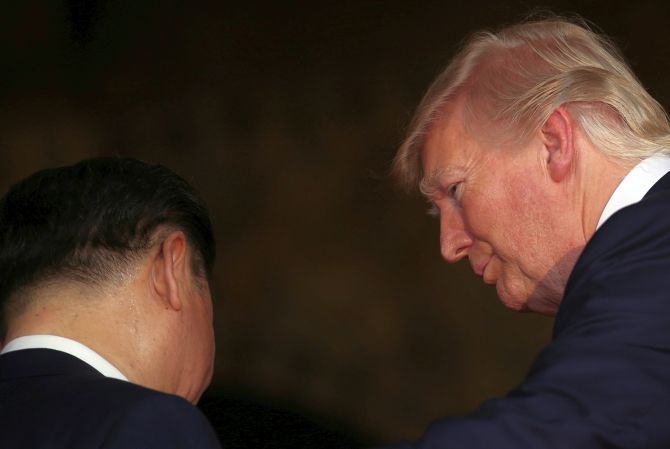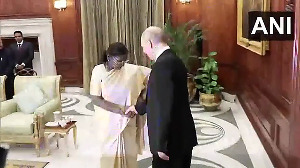United States President Donald Trump and his Chinese counterpart Xi Jinping wrapped up their first summit by announcing a 100-day plan to improve strained trade ties, the only tangible announcement after their meetings that were overshadowed by the US military strikes in Syria.

Trump aides, who participated in the two-day talks held at the US President’s Mar-a-Lago resort in Florida, described the meetings as productive and said the two leaders exhibited “positive” chemistry.
Commerce Secretary Wilbur Ross on Friday said the two sides agreed to speed up trade talks to help close a lopsided imbalance in China’s favour, a common campaign-trail complaint of Trump’s.
During the meetings, Trump highlighted the challenges caused by the Chinese government intervention in its economy and raised serious concerns about the impact of China’s industrial, agricultural, technology and cyber policies on America’s jobs and exports, White House Press Secretary Sean Spicer said.
Spicer said Trump underscored the need for China to take concrete steps to level the playing field for American workers, stressing repeatedly the need for reciprocal market access.
The 100-day plan to improve trade ties was the only tangible announcement to come out of the meetings that few expected to be much more than a get-acquainted exercise, The New York Times said.

China is now the largest trading partner of the US. Last year, two-way trade reached $519.6 billion, compared to $2.5 billion in 1979 when the two nations established diplomatic ties.
The talks were overshadowed by a crisis in Syria as Trump, just before his dinner with Xi, ordered a massive military strike on a Syrian air base in retaliation to a “barbaric” chemical attack on civilians allegedly by embattled President Bashar al-Assad’s regime.
The two leaders agreed that their first meeting was “positive and fruitful”, China’s state-run Xinhua news agency said.
During their talks over the two days, Xi and Trump exchanged views on key areas of bilateral cooperation as well as global and regional issues of common concern, it said.
Xi, 63, said that he and Trump, 70, have gained better understanding of each other, cemented their mutual trust, scored many major consensuses, and built up a good working relationship.
Noting that the two leaders had positive and productive meetings, Spicer said Trump and Xi agreed to work in concert to expand areas of cooperation while managing differences based on mutual respect.
Trump had hoped to use the trade issue as leverage to get China, North Korea’s closest ally, to pressure the reclusive nation to give up its nuclear weapons programme.
China and the US agreed that Pyongyang’s programmes are a serious problem, but have not seen eye-to-eye on how to respond.
“The two sides noted the urgency of the threat of North Korea’s weapons programmes, reaffirmed their commitment to a denuclearised Korean peninsula and committed to fully implement UN Security Council resolutions,” Spicer said.
“The Presidents’ discussions on North Korea were very wide-ranging, very comprehensive, and more focused entirely on both countries’ previous commitments to denuclearise the peninsula. There was no kind of a package arrangement discussed to resolve this,” Secretary of State Rex Tillerson said.

Trump and Xi agreed to increase cooperation and work with the international community to convince North Korea to peacefully resolve the issue and dismantle its illegal nuclear and missile programmes, Spicer said, adding that the two sides had a candid discussion on regional and maritime security.
“President Trump noted the importance of adhering to international rules and norms in the East and South China Seas and to previous statements on non-militarisation. He also noted the importance of protecting human rights and other values deeply held by Americans,” Spicer said.
The two leaders established US China Comprehensive Dialogue, elevating their dialogue status.
“The two presidents agreed to elevate existing bilateral talks to reflect the importance of making progress on issues,” Spicer said.
Trump and Xi also established a new and cabinet-level framework for negotiations, he said.
The United States-China Comprehensive Dialogue will be overseen by the two presidents and have four pillars: Diplomatic and Security Dialogue; Comprehensive Economic Dialogue; Law Enforcement and Cybersecurity Dialogue; and Social and Cultural Issues Dialogue.
“The two sides agreed to undertake an ambitious agenda and meeting schedule to show progress and demonstrate meaningful results,” he said.
“This visit was a great opportunity for both presidents and their wives to get to know one another, enjoy meals together, and work on important issues. Each side also brought a senior delegation that was also able to build relationships for the work ahead,” Spicer said.

They reviewed the state of the bilateral relationship and noted the importance of working together to generate positive outcomes that would benefit the citizens of both countries.
Xi invited Trump to visit China later this year. Trump accepted the invitation.
“President Trump welcomed President Xi’s invitation to visit China for a state visit at a future date. They agreed to work together in the interim to ensure a successful and results-focused visit,” Spicer said.
To boost bilateral ties, Xi underlined the importance of further enhancing economic, military and law enforcement cooperation and people-to-people exchanges.
China and the United States are now each other’s biggest trading partner, from which the two peoples benefit a lot, Xinhua news agency quoted Xi as saying.
“China welcomes the US side to participate in cooperation within the framework of the Belt and Road Initiative,” said Xi.
On defence ties, which he said make up an important part of the bilateral relations, Xi pointed out that mutual trust in military and security areas forms the basis of the
strategic mutual trust between the two countries.
During the summit, Trump appeared to have toned down his anti-China rhetoric.
Despite his tough campaign talk, Trump has so far not followed through on his threat to formally brand China a “currency manipulator”, nor to hit Chinese imports with punitive tariffs.
When Xi came to the US two years ago, Trump attacked the former president Barack Obama’s red-carpet welcome, claiming he would have offered a Big Mac rather than a state dinner to a leader whose country he has accused of “raping” the American economy.
Trump outraged China in December when he took the unorthodox step of accepting a phone call from the Taiwanese president. But the US president later agreed to respect the “One China” policy in a telephone call with President Xi in February.










